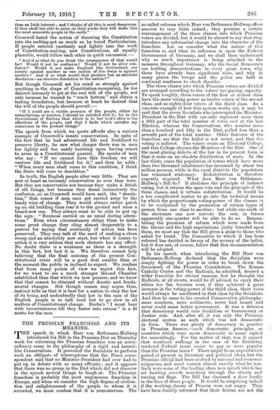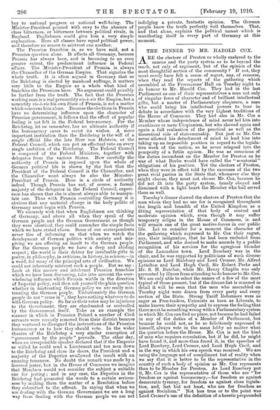THE PRUSSIAN FRANCHISE AND ITS MEANING-. rpnE speech in which
Herr von Bethmann-Hollweg 1 introduced his Bill in the Prussian Diet on Thursday week for reforming the Prussian franchise was an extra- ordinary essay in the philosophy of a rigid. and hermit- like Conservatism. It provoked the Socialists to perform such an obbligato of • interruptions that the Times corre- spondent said that no Minister-President had ever had to put up in debate with so many affronts ' • and it appears • that there was no group in the Diet which did not discover in the speech several things to laugh at. The Prussian _ franchise is probably the most ungenerous franchise in Europe, and when we consider the high degree of civilisa- tion and enlightenment of the people to whom it is _accorded, we must confess that it is preposterous. The so-called. reforms which Herr von Bethmann-Hollweg offers amount to very little indeed ; they promise a certain rearrangement of the three classes into which Prussian voters are divided, but it would be absurd to say that they introduce any substantial change into the character of the franchise. Let us consider what the nature of this franchise is, and what its influence is upon the Federal Government of Germany, and we shall then understand why so much importance is being attached. to the measure throtghout Germany, why the Social Democrats are holding demonstrations in every great town, why there have already been significant riots, and why in many places the troops and the police are held in continual readiness to check disorder.
The three classes into which Prussian voters are divided are arranged according to the voters' tax-paying capacity. To speak roughly, three voters of the first or richest class have the same voting-power as twelve voters of the second class, and as eighty-four voters of the third class. As a concrete example of how this system works out, it may be said that the seven Socialists who interrupted the Minister- President in the Diet with cat-calls represent more than a fifth part of the total number of votes cast at the last Election, whereas the Conservatives, who number more than a hundred and fifty in the Diet, polled less than a seventh part of the total number. Other features of the franchise are that the ballot is not secret, and that the voting is indirect. The voters create an Electoral College, and this College chooses the Members of the Diet. One of the most glaring defects of the law in its present form is that it rests on an obsolete distribution of seats. In the last thirty years the population of towns which have more than two thousand inhabitants has increased by about ten million persons, while in the rural districts the population has remained stationary. Redistribution is therefore urgently required. What does Herr von Bethmann- HoLlweg s Bill do ? It abolishes the principle of indirect voting, but it retains the open vote and the principle of the three classes, and it refuses redistribution. It would be a too complicated. matter to go into the technical means by which the proportionate voting-power of the classes is to be readjusted by the promotion of certain types of person from one class to another ; but while one-sixth of the electorate can now outvote the rest, in future apparently one-quarter will be able to do so. Remem- bering the promises of reform which were made from the throne and the high expectations justly founded upon them, we must say that the Bill gives a stone to those who asked for bread. The Committee to which it has been referred. has decided in favour of the secrecy of the ballot, but it does not, of course, follow that this recommendation will be adopted.
In his speech when introducing the Bill Herr von Bethmann-Hollweg declared that the Socialists were simply fighting for power in order to break down the framework of the Prussian Constitution. The Roman Catholic Centre and the Radicals, he admitted, desired a wider franchise for ethical reasons, but he thought the Radicals, at all events, would. be ill advised to carry their ethics too far, because even if they achieved a great increase in the voting-power of the third class, their voice would always be smothered in that class by the Socialists. And then he came to his crusted Conservative philosophy: mere numbers, mere arithmetic, never had meant and never could, mean better government. It was a delusion that democracy would. cure feudalism or bureaucracy or Junker rule. And, after all, it was only the Prussian electoral system as such which was not democratic in form. There was plenty of democracy in practice in Prussian finance,—such democratic principles as countries which were more democratic in name sighed for unavailingly. For the matter of that, was it argued that manhood suffrage in the case of the Reichstag rendered. Federal taxes easier to pay or more popular than the Prussian taxes ? There might be an unproductive period at present in literature and political ideas, but the Prussian official had been evolved by national and economic exigencies, and must remain almost exactly what he was. Such were some of the leading ideas in a speech which has set bawling crowds marching through the streets and waving red flags. The Bill has slammed a door loudly in the face of those people. It would. be surprising indeed if the working classes of Prussia were not angry. They have been frankly informed that their desires are not the key to national progress or national well-being. The Minister-President pointed with envy to the absence of class bitterness, or bitterness between political rivals, in England. Englishmen could give him a very simple explanation. Here all classes have equal political power, and therefore no reason to mistrust one another.
The Prussian franchise is, as we have said, not a Prussian question alone. It affects all Germany, because Prussia has always been, and is becoming to an even greater extent, the predominant influence in Federal affairs. The Minister-President of Prussia is always the Chancellor of the German Empire. That signifies the whole truth. It is often argued in Germany that as the Reichstag is elected by manhood suffrage, it matters very little to the Empire as a whole what kind of franchise the Prussians have. No argument could possibly be farther from the truth. The fact that the Prussian working man is a real personality vis-a-vis the Empire, but a nonentity vis-a-vis his own State of Prussia, is not a matter which concerns him alone. Because the elections in Prussia have no determining influence upon the character of Prussian government, it follows that the effect of popular feeling is not felt in the Federal bureaucracy. For the Reichstag, let us remember, has no ultimate authority if the bureaucracy cares to resist its wishes. A more important institution than the Reichstag is the will of a single official like the late Herr von Holstein, or the Federal Council, which can put an effectual veto on every single ambition of the Reichstag. The Federal Council is composed of the Federal Ministers, together with delegates from the various States. How carefully the authority of Prussia is imposed upon the whole of German political life is shown by the fact that the President of the Federal Council is the Chancellor, and the Chancellor must always be also the Minister- President of Prussia. Here is a circle of authority indeed. Though Prussia has not, of course, a formal majority of the delegates in the Federal Council, experi- ence has shown that she is almost always able to manipu- late one. Thus with Prussia controlling Germany it is obvious that any material change in the body politic• of Germany must begin with Prussia. We sincerely wish that when Englishmen are thinking of Germany, and above all when they speak of the German people and the German Government as though they were identical, they could remember the simple facts which we have stated above. Some of our correspondents never tire of informing us that when we watch the development of German politics with anxiety and mis- giving we are offering an insult to the German people. For the German people we have a deep and abiding respect ; the world is their debtor for invaluable gifts in poetry, in philosophy, in criticism, in history, in science,—in a word, for many of the principal arts of civilisation. We could not inherently mistrust such a people. But we say : Look at this narrow and intolerant Prussian franchise which we have been discussing, take into account the over- whelming influence which Prussia wields in the direction of Imperial policy, and then ask yourself the plain question whether in mistrusting German policy we arc really mis- trusting the German people. Unfortunately the German people do not " come in " ; they have nothing whatever to do with German policy. So far as their votes may be injurious to the Government, they are checkmated or controlled by the Government itself. Take as an example the manner in which in Prussian Poland a number of Civil servants were recently removed from their district because they ventured to disregard the instructions of the Prussian bureaucracy as to how they should vote. In the wider theatre of the Reichstag a very similar conception of " government by the people " prevails. The other day, when an irresponsible speaker declared that if the Emperor so willed he could send a Lieutenant and ten men down to the Reichstag and close its doors, the President and a majority of the Deputies swallowed the insult with an amazing tameness. No doubt the remark was made by a licensed jester, but in the House of Commons we imagine that Members would not consider the subject a suitable one for jesting ; and in any case, the Deputies in the Reichstag had promoted the words to a certain serious- ness by making them the matter of a Resolution before they submitted to the affront. In saying that when we aro dealing with the German Government we are a long way from dealing with the German people we are not indulging a private, fantastic opinion. The German people know the truth perfectly well themselves. That, and that alone, explains the political unrest which is manifesting itself in every part of Germany at this moment.









































 Previous page
Previous page